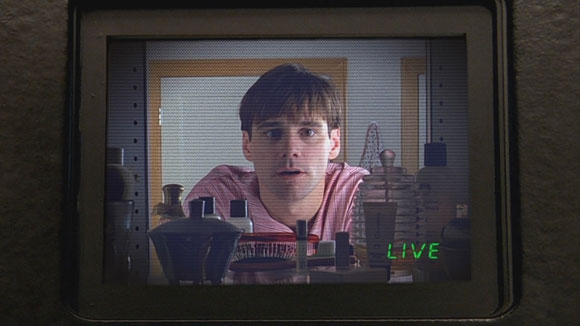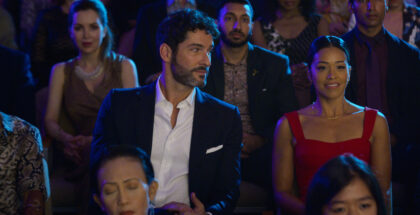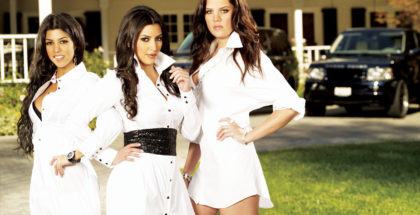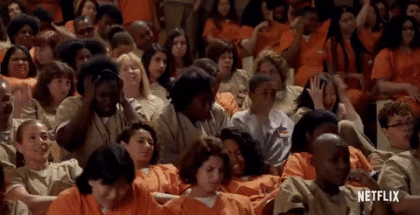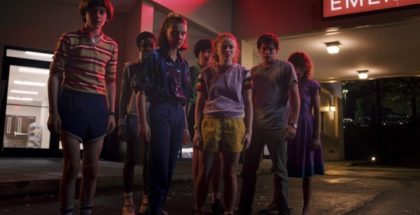The 90s on Netflix: The Truman Show (1998)
Review Overview
Good morning
10Good afternoon
10Good evening and goodnight
10Mark Harrison | On 13, Oct 2023
Director: Peter Weir
Cast: Jim Carrey, Ed Harris, Laura Linney, Noah Emmerich, Holland Taylor, Natascha McElhone
Certificate: PG
Would it be pat to say 1998’s The Truman Show predicted where we are now, in the week that Big Brother returned for its second reboot and 20th regular season? Well, we’re going to say it anyway – Peter Weir’s world-building media satire is one of those films that could only be made when it was, late enough in the 1990s for the story to really take shape, but before reality TV truly took hold in the decade after.
Jim Carrey plays Truman Burbank, a 30-year-old man whose small-town malaise turns to paranoia when a stage light crashes to Earth outside his home. Little does he realise that his hometown Seahaven is a giant studio, and his entire life has been a hit TV show executive-produced by “televisionary” Christof (Ed Harris) from a gallery in the artificial moon.
The project was first dreamt up by writer Andrew Niccol in 1991 as “The Malcolm Show”, a science-fiction thriller set in New York City. When producer Scott Rudin and director Peter Weir boarded the project, it underwent umpteen drafts before shooting. As filmed, it mixes light and dark in a deceptively character-led treatment of an idea so high-concept, it’s become one of those movie titles, like Groundhog Day or Indecent Proposal, that’s entered into common language. You don’t even need to have seen the film and you get the idea of “what if you’re the star of a TV show everyone else is watching”.
We’ve covered lots of 1990s Jim Carrey movies in this column, but this is the 1990s Jim Carrey movie unlike any other in style or substance – the best film to come out of the star’s peak era of movie stardom. At the point he was pulling down $20 million per film, he duly took a pay-cut (he was paid $12 million, a fifth of the film’s entire budget) and jumped at the chance to make more dramatic work after a string of comedy blockbusters.
There was Oscar hype about his performance upon release and it’s not hard to see why – this is at once a departure from his work at the time and the role he was born to play. Truman has grown up in the world of a show that’s been on TV since the 1960s, and he speaks in sunny catchphrases like his opener, “Good morning, and in case I don’t see you, good afternoon, good evening, and goodnight!” As soon as he begins to glean that everything he knows is artificial, his world comes apart. It’s a role that requires Carrey’s sunny, goofy grin in the morning, but also his mania in that long, dark afternoon of the soul.
Weir uses the medium of television incredibly effectively throughout the film, whether it’s cluing us in with candid camera POV shots (before Big Brother made that part of telly grammar) and cuts to a rapt viewing audience or explaining the backstory with a midpoint retrospective documentary fronted by Harry Shearer’s TV presenter.
Soap opera plays a recognisable role too, as Truman’s suspension of disbelief begins to lift. His constant companions Meryl (Laura Linney) and Marlon (Noah Emmerich) speak in blatant product placements. His presumed-dead father (Brian Delate) turns up after years away because the actor wants back in. Even Truman’s flashbacks to a spoiled romantic encounter with fired supporting artiste Sylvia (Natascha McElhone) are portrayed in clip-show form on his 24-hour channel.
Unlike The Matrix’s simulation sci-fi thrills the following summer, the world-building here is largely happening in the background. It’s fully an hour into the movie before we get any real exposition about the show and its self-contained “Omni Cam Echosphere”, a futuristic creation that’s purely functional in a satire that could easily take place a year later.
Perhaps most prescient of all is the portrayal of Christof by Harris as the kind of pretentious “disruptor” figure that’s been running (and ruining) the real world for the past few years. Peeping on his reality from behind spectacles and a beret, his God figure is torn down and laid bare as the film barrels into its rapturous finale – a “good evening and goodnight”.
Critically acclaimed upon release, The Truman Show also enjoyed tremendous crossover success with Carrey’s audience. Oscar night was dominated by Shakespeare In Love and Saving Private Ryan, but Carrey and Harris won Golden Globes, Weir won a BAFTA and, 25 years on, the film only looks better with age.
While Carrey has relaxed his “no sequels” rule over the years, there’s no sign of revisiting the character – it would probably be a sadder film, because think about recent years and imagine trying to tell Truman Burbank he’s being paranoid ever again. Niccol says he once pitched a sequel TV series for the multi-channel era where two subjects meet each other, but one of the reasons this one is so timeless is that it’s so speculative and spot-on.
As Christof intones to camera at the start: “We’ve become bored with watching actors give us phony emotions. We’re tired of pyrotechnics and special effects. While the world he inhabits is in some respects counterfeit, there’s nothing fake about Truman himself. No scripts, no cue cards… It isn’t always Shakespeare but it’s genuine. It’s a life.”
Niccol and Weir set that up and then spend the next 90 minutes of screentime exploding that view, right up to the comically understated final shot. Boasting Jim Carrey’s best-ever performance, The Truman Show is a triumph of both media satire and cinematic empathy.
Next time on The 90s On Netflix…
“It was not the custom in New York drawing rooms for a lady to get up and walk away from one gentleman in order to seek the company of another. But the Countess did not observe this rule.”


